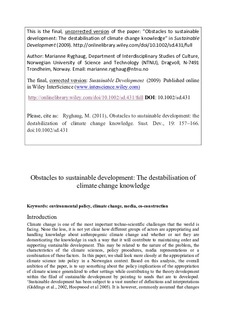Obstacles to sustainable development: The destabilisation of climate change knowledge
Abstract
The appropriation of climate change knowledge may be a very important factor for promoting radical changes towards sustainable development. By studying three sets of actors, the science community, the media and the political community, the author reveals how climate change knowledge and politics is stabilized and destabilized in Norway. The article provides an analysis of the opposing forces that appear to mould climate change policy in Norway. The article suggests that policy follows up on the recommendations of the research community only to a small extent, even though it believes its conclusions. By reference to the literature on co-production, the article demonstrates that the climate science so far has not managed to stabilize the climate policy because (1) mass media contributes to maintaining several (and often opposing) climate discourses, (2) the dialogue between science and policy does not function well, (3) there is a lack of institutions where climate policy meets climate science, (4) the identity of ‘climate politician’ does not exist among decision-makers and (5) the representations of climate knowledge have an unclear relationship with the representations of the climate policy scientific controversy created by the media, which destabilize the climate change knowledge. Based on these findings, the author argues that it is fruitful to study sustainable development within a co-productionist framework, as the development and behaviours of individuals, institutions and organizations on which sustainable development is dependent is often ‘co-produced’ by different actors.
